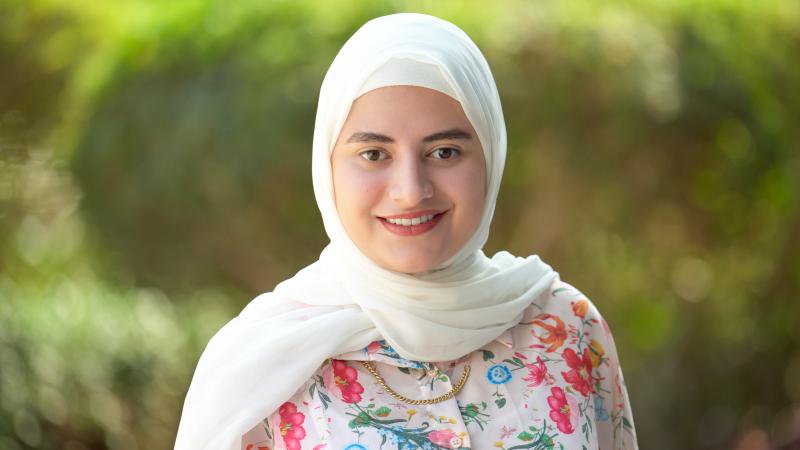By David Murphy
KAUST alumna Wedyan Babatain (Ph.D. Electrical Engineering, '22) was recently named one of MIT Technology Review Arabia's "MENA Innovators Under 35 (IU35)" for 2022. The Saudi native received recognition for her research developing a soft multifunctional wearable platform using graphene and liquid metal-based electronics.
Together with 14 other trailblazers, including KAUST researchers Asmaa Abdallah and Jehad El-Demellawi, Babatain was acknowledged by a leading panel of academic and industry experts as being among the young innovators "who are advancing science and technology" in the MENA region.
Since 1999, the annual list has recognized the work of exceptionally talented young innovators under the age of 35. The awards span various fields, including biotechnology, materials, computer hardware, energy, transportation, communications and the internet.
Founded in 2018, the MENA contest is the regional version of a global awards scheme. This year's awards featured a wide range of innovations in technology, biotechnology, computer science, medicine and materials science.
Babatain is currently a postdoctoral research fellow at the Massachusetts Institute of Technology (MIT) Media Lab. She is developing soft tangible interfaces, interactive electronics, and soft robotics platforms using programmable materials such as liquid metals for wearable and non-wearable applications.
"I am honored to have been selected by MIT Technology Review as one of the Innovators under 35 (MENA) for 2022," Babatain said of her selection. "I am very grateful to my mentor and advisor, Professor Muhammad Mustafa Hussain, for his continued support. I would also like to acknowledge and thank my close collaborators at KAUST, Professors Nazek El-Atab and Ulrich Buttner, who contributed to the work the award recognizes."
Developing next-generation, soft inertial motion sensors
Physical-compliant electronics continue to attract attention to the field of wearable devices due to their compatibility with human skin. Soft inertial motion sensors remain among soft electronics' least explored sensors compared to other health sensors. Consequently, research on soft motion sensors has mainly focused on developing sensing elements restricted to attaching flexible sensors to certain body joints to induce signal transduction.
Babatain's research aims to create next-generation soft inertial motion sensors with fatigue-free proof masses, enabling conformal interfaces with the human body to collect valuable health information.
"Our invention introduces a novel multifunctional platform that utilizes emerging materials such as laser-induced graphene, a liquid metal, as the main sensing elements," she explained. "The conformal platform is capable of inertial-based acceleration measurement and integrated to wirelessly monitor motion, temperature, humidity and breathing patterns.
"The high mobility of the liquid metal droplet is achieved via a graphene interpenetrated, nest-like coating of the outer droplet shell, yielding high device sensitivity and repeatability."
According to Babatain, the conformal wearable platform can be used to monitor health and physical activity patterns. Additionally, it can be used for rehabilitation purposes to assess the effect of treatment and progression of diseases, such as Parkinson's disease.
"In addition to tracking the physical activities of people with movement disorders, the platform can also be used for the early detection of gait and balance disorders, as well as in medical alert systems such as fall detection for the elderly," she explained.
"Joining MIT has been a dream for me since high school. I am very grateful to experience MIT's exploratory research culture to develop my scientific, engineering, design and personal skills. Thanks to both KAUST and MIT, I am further fulfilling my mission to develop democratized disruptive technologies that enhance our quality of life," she concluded.



